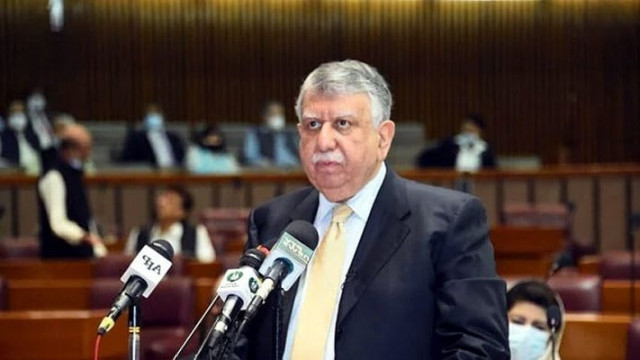Govt to retain power to arrest tax evaders: Tarin
Allies decry heavy taxation on food products as it may cause double-digit inflation

Finance Minister Shaukat Tarin on Wednesday reiterated that power to arrest people on concealment of income would be retained, as the government’s coalition partners decried the heavy taxation on daily consumable and food products that might stoke double-digit inflation.
Speaking during the meeting of the Senate Standing Committee on Finance, the new economic czar announced that the powers to arrest people would be taken back from a grade-19 assistant commissioner but would rest with a committee comprising him, the special assistant to PM on revenue and the Federal Board of Revenue (FBR) chairman.
“The text of the Clause 203A does not reflect my intentions and I have asked the law minister to rewrite it,” Tarin said while responding to criticism over allowing FBR assistant commissioner to arrest people on the suspicion of concealment of income.
“The FBR itself cannot do anything against the taxpayer and instead a third party will deal with the issue,” he added.
“A committee comprising the finance minister, the special assistant to PM on revenue and the FBR chairman will make the decision on arresting people on the charges of tax evasion.”
The minister further said the government wanted to use the powers to arrest only for deterrence and did not intend to arrest more than 20 to 25 people.
“The flurry of tax notices by the FBR has also been stopped.”
Read: Plan to impose taxes worth Rs100b dropped: Tarin
Tarin offered the standing committee to propose changes in the clause but he repeatedly stressed the need to retain these powers.
There is lack of tax culture in Pakistan and the country’s elites even do not want to file their annual income tax returns.
The government has proposed exempting all political parties from income tax while also allowing them not to file their annual income tax returns.
“I will look into this matter, as I do not know about this clause,” Tarin said after the meeting when he was asked about the issue.
During the committee meeting, MQM-P’s Senator Faisal Subzwari asked about putting the additional burden of Rs10 billion on the salaried class.
Tarin replied that he has already asked the FBR to withdraw the proposed legal changes.
Later, Senator Subzwari raised the question as to whether or not finance minister would have enough time to decide about matters such as arrests.
PPP’s Senator Sherry Rehman said the committee members were of the view that Clause 203A should be deleted from the Finance Bill.
She criticised the government for not discussing the IMF programme in parliament.
“The government had claimed that they were renegotiating with the IMF and that they have refused to meet its strict conditions but we see no details on the way forward on key issues like inflation and unemployment,” she added.
“All we see are a slew of hidden and open indirect taxes, and tariffs worth billions on the people. All agreements need to be presented to parliament but we are not aware of the bargains which are being transacted with the IMF. Why is the parliament being kept in the dark? All our governments have brought IMF programmes but none of them were like this. This IMF deal is being severely criticised”.
However, Tarin ruled out the possibility of exiting the IMF programme.
Heavy indirect taxation
The clause-by-clause reading of the Finance Bill by the standing committee revealed that the government had significantly increased sales tax rates on imported and locally produced and consumed items.
The FBR has proposed increasing sales tax rates to 17% on local sales of agriculture machinery, soybean meal, raw and ginned cotton, flavoured milk, butter, packaged yogurt, cheese, cream, milk, poultry and cattle feed, soybean seeds, harvesters and LNG.
“Imported food items are taxed to generate additional revenues and also discourage their import,” said Tariq Chaudhry, an FBR official.
The government has proposed imposing 17% tax on the import of eggs, cereals, products of milling industry, sugar beet, milk and cream, flavoured milk, yogurt, whey, butter, desi ghee, cheese, sausages, meat and fat-filled milk.
Similarly, the government has also proposed a 17% GST on the import of aircraft, either purchased or taken on lease, plants and machinery, bicycles, energy saver lamps and bulbs, and ships.
“In beginning, indirect taxes will go up,” said Tarin while responding to criticism over imposing heavy indirect taxes including petroleum levy.
The government’s three key allies -- the MQM-P, the PML-Q and the Balochistan Awami Party (BAP) joined hands with the PPP and the PML-N in the committee against massive indirect taxation in the budget.
Read more: Federal budget focuses on sustainable economic growth: Tarin
“Looking at the nature of the new taxes, it seems Shaukat Tarin might not stay finance minister for more than two months,” said PML-Q’s Senator Kamil Ali Agha. “It is insane to impose 17% sales tax on children’s dairy products,” he added.
Senator Agha said the budget proposals would fuel inflation and were also against the policy of Prime Minister Imran Khan.
Defending the taxes on dairy products, Senator Mohsin Aziz of the PTI claimed that the lowest paid employee of the Senate Secretariat also received a monthly salary of Rs60,000 and could afford these items.
BAP’s Senator Prince Omar Zai said on one hand, Tarin had announced Rs200,000 loans for the farmers to procure agriculture machinery, but on the other, imposed taxes on machinery import.
Senator Sadia Abbasi of the PML-N said we could not allow to bridge revenue shortfall by imposing taxes on daily usable items.
Tariq Chaudhry of the FBR said the prices of these items would marginally move upward after the increase in sales tax rates.
Senator Subzwari pointed out that the government was giving Rs2 billion income tax relief to the stock market but was imposing taxes on yogurt and milk, which spoke about its priorities.
PPP’s Senator Saleem Mandviwalla maintained that the proposed taxes were “anti-growth” and “anti-industry”.
The standing committee directed FBR Chairman Asim Ahmed to review the taxes proposed to be imposed on food items and industrial and agriculture machinery.





1724912122-0/Untitled-design-(1)1724912122-0-208x130.webp)













COMMENTS
Comments are moderated and generally will be posted if they are on-topic and not abusive.
For more information, please see our Comments FAQ